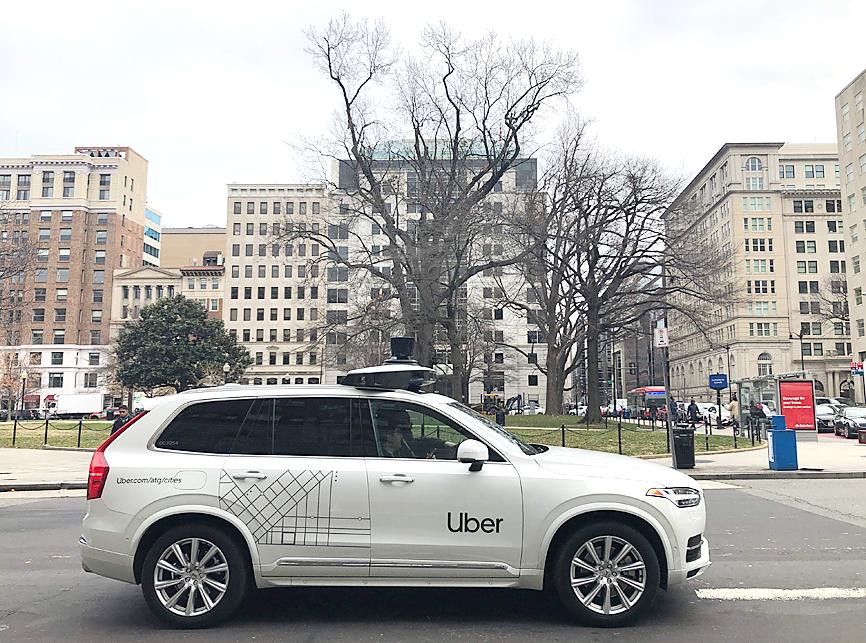Uber Technologies Inc has agreed to sell its autonomous vehicle division to Aurora Innovation Inc in a deal that gives the ride-hailing company a stake in the start-up developing self-driving technology, the companies said on Monday.
As part of the deal, Uber is to invest US$400 million in Aurora to merge the teams from both firms seeking to advance the technology for autonomous ride-hailing and is to hold a 26 percent stake in Aurora.
“By adding the people and technology of Uber’s Advanced Technologies Group [ATG] to the incredible group we’ve already assembled at Aurora, we’re shifting the landscape of the automated vehicle space,” said Chris Urmson, cofounder and chief executive of Aurora, which has been backed by Amazon.com Inc, Fiat Chrysler Automobiles NV and Hyundai Motor Co, among others.

Photo: AFP
The sale of Uber’s autonomous driving unit, which was temporarily stalled several years back after a fatal crash, comes as it streamlines operations to navigate a downturn caused by the COVID-19 pandemic.
Uber does not appear to be giving up on self-driving vehicles, which have been part of its vision for a profitable ride-share business, but is instead swapping the unit for a stake in Aurora.
“With the addition of ATG, Aurora will have an incredibly strong team and technology, a clear path to several markets, and the resources to deliver,” Urmson said.
“Simply put, Aurora will be the company best positioned to deliver the self-driving products necessary to make transportation and logistics safer, more accessible, and less expensive,” Urmson added.
Along with acquiring ATG, Aurora announced a strategic partnership with Uber to mesh its technology with that of the leading ride-hailing service, the companies said.
The companies expect self-driving technology to be initially put to use for long-haul trucking.
Uber chief executive Dara Khosrowshahi is to join the Aurora board of directors as part of the deal.
The merged firm is to work on technology to be known as Aurora Driver.
“Few technologies hold as much promise to improve people’s lives with safe, accessible, and environmentally friendly transportation as self-driving vehicles,” Khosrowshahi said.
“I’m looking forward to working with Chris, and to bringing the Aurora Driver to the Uber network in the years ahead,” he said.

UNCERTAINTY: Innolux activated a stringent supply chain management mechanism, as it did during the COVID-19 pandemic, to ensure optimal inventory levels for customers Flat-panel display makers AUO Corp (友達) and Innolux Corp (群創) yesterday said that about 12 to 20 percent of their display business is at risk of potential US tariffs and that they would relocate production or shipment destinations to mitigate the levies’ effects. US tariffs would have a direct impact of US$200 million on AUO’s revenue, company chairman Paul Peng (彭雙浪) told reporters on the sidelines of the Touch Taiwan trade show in Taipei yesterday. That would make up about 12 percent of the company’s overall revenue. To cope with the tariff uncertainty, AUO plans to allocate its production to manufacturing facilities in

Taiwan will prioritize the development of silicon photonics by taking advantage of its strength in the semiconductor industry to build another shield to protect the local economy, National Development Council (NDC) Minister Paul Liu (劉鏡清) said yesterday. Speaking at a meeting of the legislature’s Economics Committee, Liu said Taiwan already has the artificial intelligence (AI) industry as a shield, after the semiconductor industry, to safeguard the country, and is looking at new unique fields to build more economic shields. While Taiwan will further strengthen its existing shields, over the longer term, the country is determined to focus on such potential segments as

TAKING STOCK: A Taiwanese cookware firm in Vietnam urged customers to assess inventory or place orders early so shipments can reach the US while tariffs are paused Taiwanese businesses in Vietnam are exploring alternatives after the White House imposed a 46 percent import duty on Vietnamese goods, following US President Donald Trump’s announcement of “reciprocal” tariffs on the US’ trading partners. Lo Shih-liang (羅世良), chairman of Brico Industry Co (裕茂工業), a Taiwanese company that manufactures cast iron cookware and stove components in Vietnam, said that more than 40 percent of his business was tied to the US market, describing the constant US policy shifts as an emotional roller coaster. “I work during the day and stay up all night watching the news. I’ve been following US news until 3am

COLLABORATION: Given Taiwan’s key position in global supply chains, the US firm is discussing strategies with local partners and clients to deal with global uncertainties Advanced Micro Devices Inc (AMD) yesterday said it is meeting with local ecosystem partners, including Taiwan Semiconductor Manufacturing Co (TSMC, 台積電), to discuss strategies, including long-term manufacturing, to navigate uncertainties such as US tariffs, as Taiwan occupies an important position in global supply chains. AMD chief executive officer Lisa Su (蘇姿丰) told reporters that Taiwan is an important part of the chip designer’s ecosystem and she is discussing with partners and customers in Taiwan to forge strong collaborations on different areas during this critical period. AMD has just become the first artificial-intelligence (AI) server chip customer of TSMC to utilize its advanced